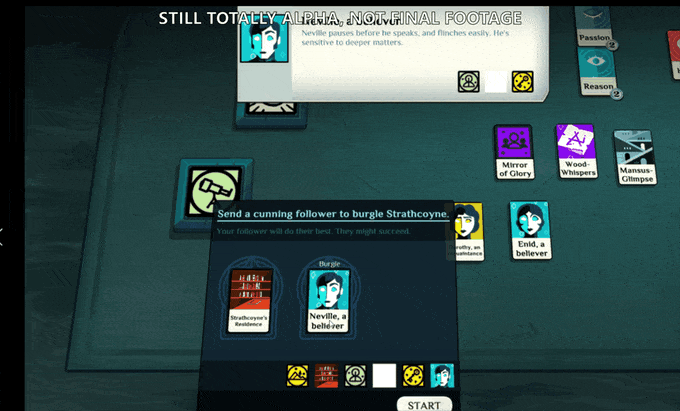Lottie Bevan’s ‘Woman With The Sandwiches’ story is a familiar tale that many women in male-dominated industries will connect with. In an interview, the co-founder of Cultist Simulator developer, Weather Factory, explains that on the hit BBC show Robot Wars, women are often sidelined and treated solely as makers of sandwiches.
While dad and son may be hard at work building their grizzly, menacing robot warrior, mum is only involved as the lady who brews the tea and cuts off the crusts, delivering sustenance to her hungry boys. (Think the Saturday Night Live ‘Totinos’ sketch, but without the gay content).

Lottie Bevan is the co-founder of Cultist Simulator developer Weather Factory.
Bevan herself has faced this very feeling. Weather Factory co-founder Alexis Kennedy (the creative director of Fallen London and Sunless Sea) has more experience in the field and so in Bevan’s role as producer on Cultist Simulator, she has to “facilitate his specific workflow.” As Bevan notes “this is the way it absolutely should be,” however, “it’s easy to feel like I’m bringing sandwiches to the garage, while what’s actually happening is I’m a 28-year-old female founder of a games studio which will (hopefully!) make some really great, well-respected games.”
Getting a Handle on Impostor Syndrome
The fear of being the ‘Woman With The Sandwiches’ is just one of the many mental hurdles that women getting into the games industry find themselves squaring up against. Bevan also describes feelings of Impostor syndrome (feeling inadequate) and feeling as though the games industry and the products it creates just aren’t made with you in mind.
Bevan says that for women in games who feel they aren’t worthy, it’s important to recognize that these thoughts “aren’t rational” and that “hearing yourself try to explain it to someone else highlights just how ridiculous your thought process is.” Furthermore, “sharing stories where you’ve felt similar self-doubt can open another dev’s eyes: if you find out your mentor, who always seems like they have it together, once curled up in bed sad-eating chips and feeling like they were awful at their job, that makes you think that maybe this is a general, shared experience you’re going through, and it’s really not that you’re actually this terrible, terrible game dev.”
It’s partly for this reason that Bevan is trying to be “as visible as possible,” including speaking to schools and universities about how to get women into the games industry and through Weather Factory’s own mentoring program.

Cultist Simulator is the first game from developer Weather Factory.
Devs Can Make ‘Small Changes’ to Include Women
Making women feel as though the games industry and its products include them is perhaps a more difficult hurdle to overcome. It is certainly one that will take more of a concerted effort to solve. For starters, at least half of the problem is that many of the biggest games “tend to feature a white muscly man set off by a sexy female love-interest sidekick, or the dreaded ‘strong female character’.”
“The women who get over that hump [of feeling like games aren’t for you] are then faced with entrenched male-centric ways of doing things in the industry. Things like pub-based socialising, or boardgame nights full of guys, or a crunch-happy norm which makes it hard to have kids and see your family. None of this is actively sexist, but at every opportunity, male preference and male assumptions are the norm.”
“Making small changes at your own studio can make a difference,” Bevan explains, “finding a way to challenge your natural assumptions is a good start.” Part of that may be just asking the women at the studio if they feel welcome, looking at female-centric game developer meet-ups to see how they organize, or just following some people on Twitter to gain a new perspective.
Bevan jokes, “when my studio makes a zillion quid, I’m immediately going to install a cat cafe and make everyone watch all eight-hundred seasons of Sailor Moon (only half of this is a lie). I can’t represent women en masse, but even when you compare my silly zillion-pound dream with the beer-drinking football culture of a lot of studios, you start noticing there’s a real maleness to the norm.”




